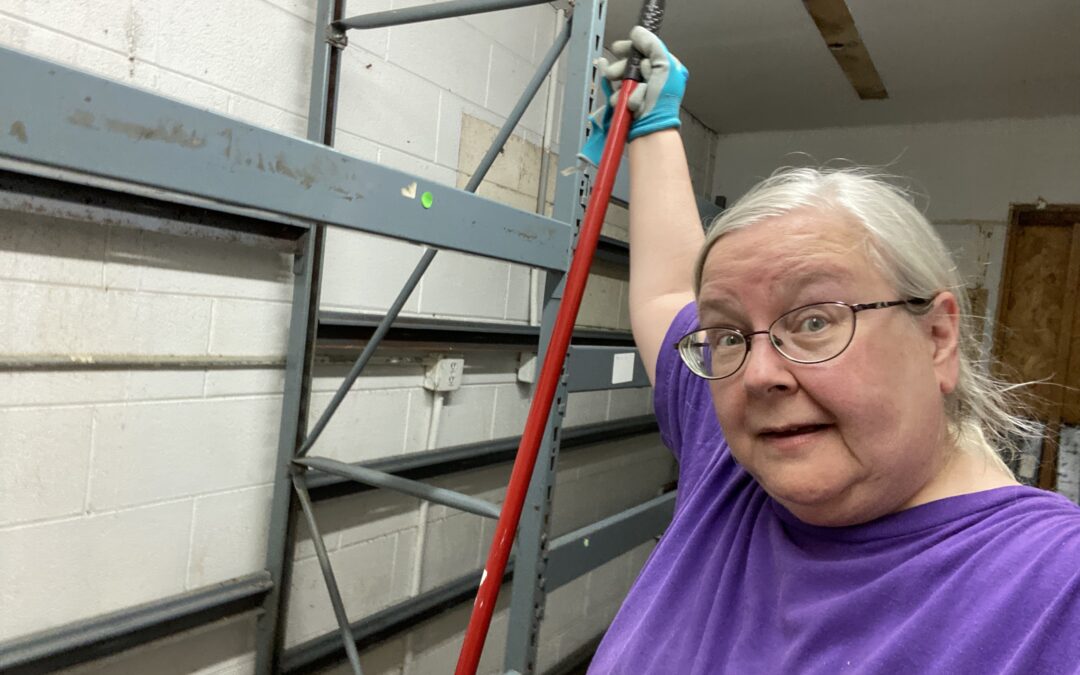Clearing the clutter in your brain is like purging a closet or storeroom. Some things you preserve, others you pitch. Sometimes you swipe away a little dust, other times you’ve got to bring in the shop vac and empty it many times …
And sneeze numerous times to keep the oxygen and thoughts flowing … in more ways than one.
My dear husband Roger and I recently helped a non-profit do some clearing and reorganization. It was exhausting, required some muscle, and we “debated” several times how things should be done, you know, “my way.” I reassured a friend there that we weren’t getting divorced … THIS year … ?
I wondered why it’s easier to work on “messes” other than your own. Why couldn’t I exert this much effort at home, in the basement, on the main floor, in the garage, in my office, in the “weird room.” (Yeah, we have this odd space we dubbed the “weird room” when we moved in eight years ago next week.)
I reflected on how I cleared my mother’s apartment after she passed away in 2018, how I sorted every item when I literally dug through my cousin’s hoarded house last year, and all the times I’ve helped other people clear paths without any difficulty.
But why can’t I do my own? Because it’s mine. I have an intimate relationship with all of my stuff and feelings cloud the road map and litter my mind with bright yellow distracting signs like “detour ahead” and “road closed.”
A friend was going to visit last week and I texted that we could talk while I organized my living room … We opted to sit on the front porch instead … I wouldn’t torture her. I’d just torture myself later staring at stuff, paralyzed by it all …
Alas, we can’t see everything “misplaced” in our lives. Sometimes we need another perspective, another person to see through the clutter of our stuff, our jobs, our relationships. We don’t like to be told what to do, but we might need another view.
Through the years, I’ve had amazing conversations with survivors and caregivers, and suggested ways they can improve their communication and connection. I’ve witnessed light bulb moments when they consider new possibilities through MY unfiltered ears and eyes. I certainly don’t have all the answers for them, as no one has all the answers for me.
It’s the process of not being pushy … and of listening, listening, listening. It’s also not beating ourselves up over our own real and/or perceived shortcomings, and being open to new ideas to solve long-term challenges.
We each have strengths and weaknesses. I can organize a 200-page book in my head, but I can’t organize the top of my desks, tables or other horizontal surfaces. That was something my mom and dad never understood, how two organized neat freaks could produce an adult without THOSE skills. They’re still shaking their heads in heaven … but are applauding everything else I do so well.
When do we ask for help? How do we help without judging or criticizing? When do we simply listen to someone who hasn’t necessarily asked for help, but shares their challenges? When do we simply take someone by the hand and say, “I understand. How can I help YOU?”
Sometimes, it’s amazing when you offer that friendly and loving, “How can I help YOU?” that it literally clears some of the brain clutter, by easing guilt and confusion and putting life into better perspective … what’s really important to ME … and what’s not? Those moments of clarity come when we least expect just because someone cares.
Now, if I could only find light bulbs for ME. Are they in the “weird room” Roger!?!?!
Hey, drop me a line at [email protected] or leave a comment below. I’d love to speak to your group, organization or company about working our way through the pain and challenges of everyday life. You want straight talk? You got me!


Recent Comments